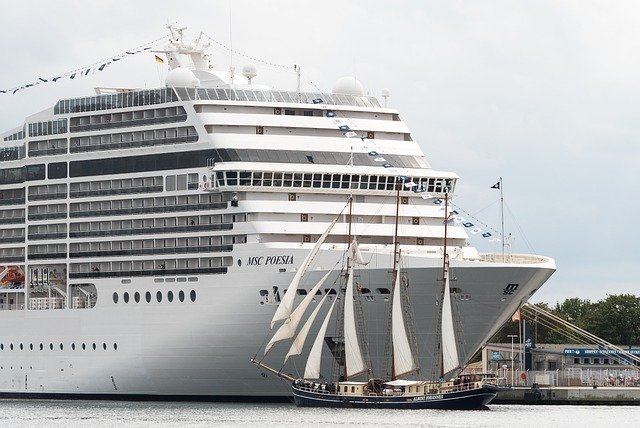Understanding Cruise Vacations: Costs, Benefits, and Planning Guide
Cruise vacations offer a unique travel experience combining transportation, accommodation, dining, and entertainment in one package. As floating resorts that visit multiple destinations, cruises provide exceptional value while eliminating the hassle of constant packing and unpacking. Whether you're a first-timer or seasoned cruiser, understanding the fundamentals can help you choose the perfect voyage.

Cruise vacations represent a distinctive approach to travel, offering passengers the opportunity to visit multiple destinations while enjoying the comforts of a floating resort. The cruise industry has evolved significantly over the decades, transforming from a luxury reserved for the wealthy to an accessible vacation option for travelers across various budget ranges. Today’s cruise ships feature diverse amenities, from world-class dining and entertainment to educational programs and adventure activities, all while transporting guests to fascinating ports of call around the globe.
What Makes Cruise Vacations Unique?
Cruise vacations stand apart from other travel options due to their all-inclusive nature. When booking a cruise, travelers typically pay one price that covers accommodation, transportation between destinations, meals in main dining venues, and most onboard entertainment. This bundled approach simplifies vacation planning and budgeting, as guests know most of their major expenses upfront. Additionally, cruises offer the unique advantage of unpacking just once while visiting multiple destinations, eliminating the hassle of checking in and out of different hotels or arranging transportation between locations.
Modern cruise ships function as floating resorts, with amenities rivaling or exceeding those found at land-based vacation destinations. Depending on the cruise line and ship, passengers might enjoy swimming pools, water slides, rock climbing walls, ice skating rinks, Broadway-style shows, movie theaters, casinos, and specialized restaurants. For many travelers, the ship itself becomes as much of a destination as the ports visited, offering a continuous stream of activities and experiences throughout the journey.
How Do Cruise Prices Compare to Other Vacations?
When evaluating cruise prices, it’s essential to consider what’s included in the fare. Entry-level cruise vacations typically start around $75-150 per person per day for inside cabins on mainstream cruise lines, with prices increasing for ocean-view rooms, balcony staterooms, and suites. This base fare generally covers accommodation, most meals, entertainment, and transportation between ports. Premium and luxury cruise lines command higher prices—often $300-1,000+ per person daily—but typically include additional amenities such as alcoholic beverages, specialty dining, gratuities, and sometimes even shore excursions.
Several factors influence cruise pricing, including the cruise line, ship age and size, cabin type, itinerary, length of voyage, and sailing date. Peak travel periods such as summer, holidays, and spring break typically command premium prices, while shoulder seasons offer better values. Additionally, cruise lines often employ dynamic pricing strategies, with fares fluctuating based on demand and remaining inventory as sailing dates approach.
| Cruise Type | Average Price Range (per person/day) | Typical Inclusions | Additional Costs |
|---|---|---|---|
| Budget/Mainstream | $75-200 | Accommodation, basic dining, entertainment | Alcoholic drinks, specialty dining, gratuities, shore excursions |
| Premium | $200-500 | Above plus some extras (varies by line) | Some specialty dining, most beverages, some excursions |
| Luxury | $500-1,000+ | All-inclusive (most dining, drinks, gratuities) | Ultra-premium experiences, some shore excursions |
| River Cruises | $300-700 | Most meals, some excursions, sometimes drinks | Premium excursions, some specialty experiences |
Prices, rates, or cost estimates mentioned in this article are based on the latest available information but may change over time. Independent research is advised before making financial decisions.
What Are the Key Advantages of Cruises?
Cruises offer numerous advantages that continue to attract both new and repeat travelers. One significant benefit is value—with accommodation, transportation, food, and entertainment bundled into one price, cruises often deliver more bang for the buck than comparable land vacations where each element must be purchased separately. This value proposition becomes particularly apparent when visiting multiple destinations, as cruises eliminate the need for separate flights, trains, or car rentals between locations.
The convenience factor represents another major advantage. Cruise travelers unpack once yet wake up in a new destination almost daily, avoiding the logistical challenges of moving between hotels. Additionally, cruises simplify meal planning—with multiple dining venues available around the clock, passengers never need to research restaurants or worry about finding appropriate dining options in unfamiliar locations.
Cruises also excel at catering to diverse travel groups with varying interests. Multigenerational families particularly benefit from the variety of activities available onboard—grandparents might enjoy educational lectures or relaxing by the pool, parents might participate in fitness classes or spa treatments, while children and teens engage with age-appropriate supervised programs. This diversity of options allows family members to pursue individual interests during the day while reuniting for meals and shared experiences.
How to Choose the Right Cruise Vacation
Selecting the ideal cruise requires considering several key factors. First, determine your preferred destinations—whether you’re drawn to Caribbean beaches, Mediterranean historical sites, Alaskan wilderness, or exotic Asian ports. Next, consider the cruise duration that fits your schedule and comfort level, ranging from weekend getaways to weeks-long voyages or even world cruises spanning months.
The cruise line and ship selection significantly impacts your experience. Each cruise line cultivates a distinct personality and atmosphere—Carnival and Royal Caribbean focus on active, family-friendly experiences; Celebrity and Princess offer more refined, premium experiences; while lines like Viking, Oceania, and Seabourn deliver luxury-oriented voyages. Ship size also matters—larger vessels (4,000+ passengers) feature more amenities and activities but can feel crowded, while smaller ships offer more intimate experiences with fewer facilities but often access smaller, less-visited ports.
Cabin selection represents another important consideration. Inside cabins provide the lowest price point but lack natural light; ocean-view cabins offer windows but no outdoor access; balcony staterooms include private outdoor space; and suites deliver expanded accommodations with premium amenities. Your choice should balance budget constraints with personal preferences regarding space and amenities.
Planning Tips for First-Time Cruisers
First-time cruisers often benefit from working with travel agents specializing in cruise vacations. These professionals can match travelers with appropriate cruise lines and itineraries based on preferences and budget, often securing promotional rates or onboard credits not available through direct bookings. Additionally, agents can provide guidance on cabin selection, dining options, and pre/post-cruise arrangements.
Timing your booking strategically can yield significant savings. Booking very early (12-18 months ahead) often secures early-bird discounts and best cabin selection, while last-minute bookings (60-90 days before sailing) might capture deep discounts as cruise lines aim to fill remaining inventory. However, last-minute bookers must remain flexible regarding cabin location and dining times.
Understanding what’s not included in the cruise fare helps prevent budget surprises. Common additional expenses include alcoholic beverages, specialty coffees, shore excursions, spa treatments, specialty dining venues, gratuities, internet access, and onboard shopping. Many cruise lines offer pre-paid packages for beverages, specialty dining, or internet access that can provide savings compared to à la carte pricing onboard.
Packing appropriately enhances the cruise experience. Beyond typical vacation clothing, consider formal attire for elegant evenings (if applicable to your chosen cruise line), comfortable walking shoes for port explorations, and appropriate attire for shore excursions. Additionally, remember essentials like sunscreen, motion sickness remedies, and any required travel documentation, including passports and visas for international itineraries.
Cruise vacations continue to evolve, offering increasingly diverse experiences to match virtually any travel preference or budget. From megaships packed with innovative attractions to intimate luxury vessels focusing on destination immersion, the cruise industry provides vacation options suitable for families, couples, solo travelers, and friend groups alike. By understanding the fundamentals of cruise vacations, travelers can select voyages that align with their preferences, resulting in memorable travel experiences and exceptional value.




